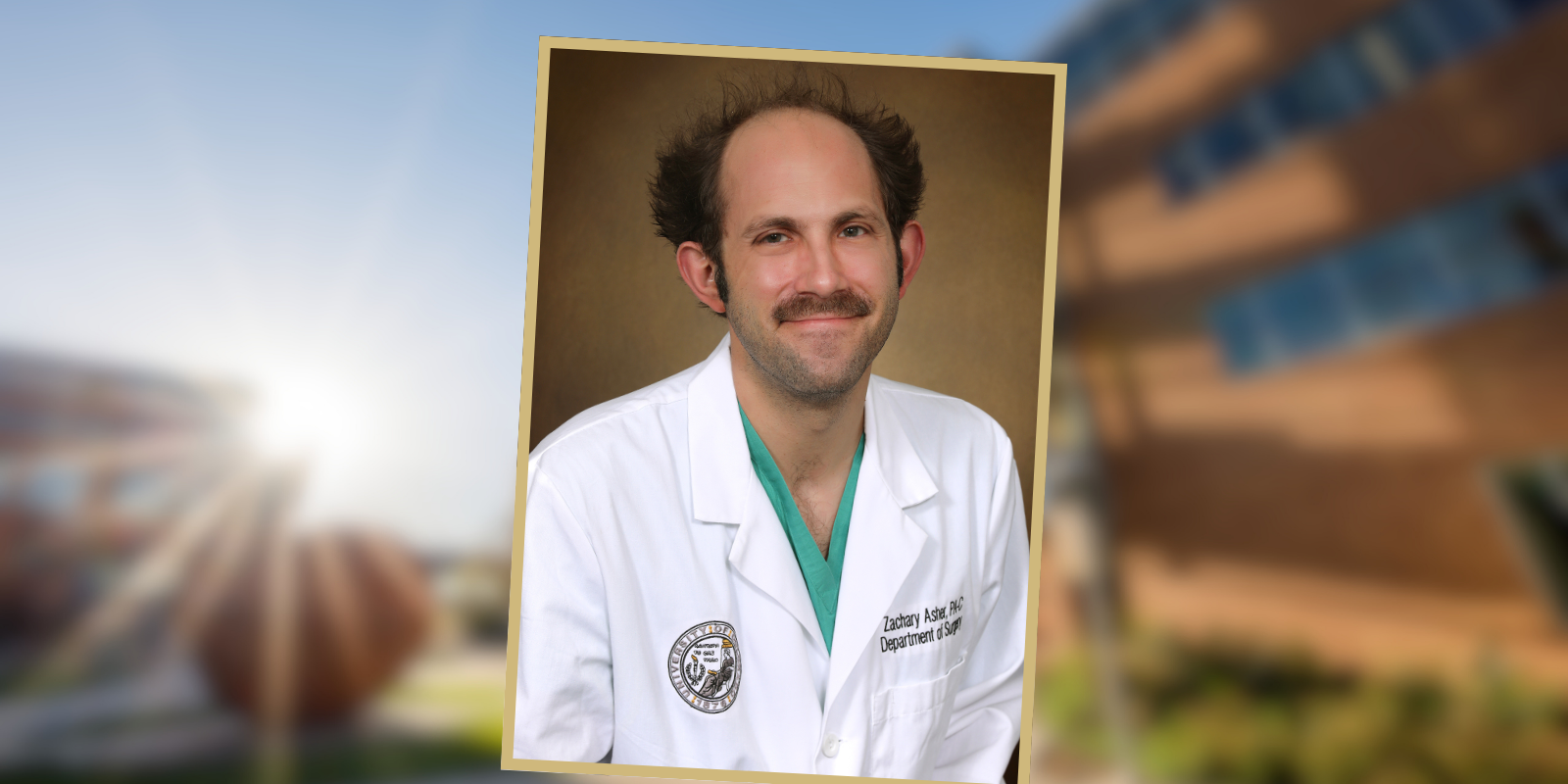As lead advanced practice provider (APP) for the surgical trauma intensive care unit (STICU) in the University of Colorado Department of Surgery, Zachary Asher, PA-C, FCCM, works across more than a dozen service lines, including acute care surgery, orthopedic surgery, vascular surgical oncology, hepatobiliary vascular surgery, transplant abdominal surgery.
Whether he is recruiting and training new APPs, training surgical residents, or coordinating care in the ICU, Asher always has the patient experience at the top of his mind.
“I really enjoy making sure that their goals and needs are addressed,” he says. “We often know what the outcome and trajectory are going to be, and it's not always favorable or aligned with what we believe the patient would want. Of course, we like the successes and good outcomes, but that's not always the case. It’s important to see the bigger picture and have those conversations and make sure that we're all on the same page.”
For his dedication to a patient-centered culture, Asher — who has been part of the CU surgery department team since 2014 — was presented with the Dean’s Distinguished Clinician Award at the Distinguished Clinician and Faculty Professionalism Awards Ceremony for the CU School of Medicine on June 5.
 Asher, left, with Robert McIntyre, MD, at the Distinguished Clinician and Faculty Professionalism Awards Ceremony.
Asher, left, with Robert McIntyre, MD, at the Distinguished Clinician and Faculty Professionalism Awards Ceremony.
“I was really surprised and honored and humbled to receive it,” he says. “I don’t consider it an award for me, but for the team that we've created in the surgical trauma ICU and the relationships and collaboration we’ve built with other specialties and other consulting services and other teams.”
Future in medicine
Asher grew up in the Park Hill area of Denver, gaining an early interest in medicine thanks to an uncle who was a neurosurgeon. He volunteered at a camp for children with cancer during high school, then did a pre-med track at Washington University in St. Louis, but it wasn’t until he returned to his home state of Colorado that his medical career came into clear view.
“I needed a break after college, so I started working in Vail as an EMT, a patient care tech, and in the ER,” he says. “I met with a diverse group of physician assistants and saw their opportunities and scope of practice, and I decided that that's what I wanted to do. I decided to focus on the ICU side of things, knowing that if I could take care of the sickest, then managing and learning and reading about the less acute would be easier than going the alternate route.”
After earning a physician assistant degree from the Duke University School of Medicine and completing a critical care fellowship in Baltimore, Asher came to the CU Department of Surgery, where in addition to overseeing the STICU advance practice providers, he serves as co-director of faculty health and engagement for the Department of Surgery.
“That is a joint sponsored role that is funded and supported by the CU School of Medicine and the Department of Surgery,” he says. “Dr. Elizabeth David and I are the inaugural co-directors, and we work with Lotte Dyrbye, MD, senior associate dean of faculty and chief well-being officer in the School of Medicine, to look at opportunities for improving culture, well-being, satisfaction, and retention, both at a school level and a department level.”
In that role, Asher has organized Grand Rounds lectures on different well-being topics and helped to create a peer support network within the Department of Surgery.
“That started in the surgical trauma ICU, initially, and we have partnered to expand the program into the entire Department of Surgery, modeling it after some of the work done at Children's Hospital Colorado,” he says “We have trained some of the APPs and physicians in the Department of Surgery on effective peer support and empathetic listening, then created a way for providers to either refer themselves or colleagues who have had stressful or unfortunate events to be supported by this group of people.”
Knocking down doors
In 2020, Asher also helped create the Rocky Mountain Chapter of the Society of Critical Care Medicine, an organization that provides education to health care providers and promotes collaborative practices and service to communities.
“There were two motivating factors for creating the chapter,” he says. “One was during COVID, reaching out to other organizations and institutions, trying to figure out who had what and who was doing what, what trials were going on, and what measures people were taking.
“There's also a recognition within the Society of Critical Care Medicine called fellow in the American College of Critical Care Medicine, and I felt like I met a lot of the qualifications and didn't get accepted initially,” Asher says. “Everybody I talked to afterward said, ‘You have all the qualifications, you just need more engagement. Why don't you join your local chapter?’ There wasn't one here, and I didn't want to join a nearby chapter just to check a box. I knew I had a lot of colleagues in a similar situation, fulfilling the criteria, except for the engagement section. So, with the support of a lot of other people, both locally and nationally, I created the chapter. I wanted not just to open doors but really knock them down and keep them open for everybody else.”
It's that collaborative spirit, his colleagues say, that made Asher an ideal candidate for Dean’s Distinguished Clinician Award. As a leader in the STICU, he is always looking to make care better for patients.
“One of my proudest accomplishments is growing the STICU APP team,” he says. “We went from two APPs in 2014 to 14 APPs now. The teamwork, collaboration, and camaraderie are incredible in the STICU.”




